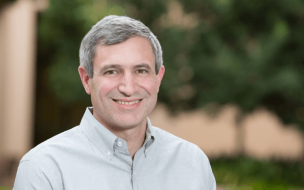Cars have always been a big part of his life, but he never believed he could work in the industry. It always seemed to be slow moving, he says. And besides, he saw it as more of a hobby.
Then along came technological advancement and the ushering in of the digital age. A game changer for Marc, and one that means he can see himself having an “exciting” career in the field.
After working as a consultant for The Boston Consulting Group (BCG), focusing on clients in the automotive industry, it was time, he decided, to delve a little deeper into the technology driving autonomous vehicle startups like Waymo and Aurora.
Where better to do that than the West Coast of America, Silicon Valley, and the MBA at the Stanford Graduate School of Business.
“Most of the future of the automotive industry, in my mind, is being developed here,” says Marc. “If there is one place to go it’s Stanford. You can explore, make connections in the field, and build knowledge.”
He comes into the Stanford MBA class after four and a half years with BCG. Before that, he was the co-founder of two edtech startups. Hubble, that built digital textbooks for IB schools across Europe, and Global Diploma, that used the same technology to provide for underperforming schools in Namibia.
Latest technology trends
One of the reasons Marc opted for the Stanford MBA is to be closer to the latest emerging trends impacting the automotive industry.
He says at Stanford Graduate School of Business there’s always see a hot topic on the lips of the students. A few years ago, it was social media, then e-commerce, and now, luckily for him, it’s autonomous vehicles.
“You find yourself discussing with classmates at lunch and over a beer at night the [latest trends] in the industry, and how we think it’s going to develop. You have a community that’s interested in the more technical things and you can really nerd out.”
The faculty at Stanford are also quick to bring the latest trends into the classroom, too. Marc says he was surprised at the number of courses available in the field of autonomous vehicles, something he puts down to the strength of the professors.
He cites Keith Hennessey, professor of Economics at the Stanford Graduate School of Business, who was interested in the field. Keith set up a car summit and moderated a discussion, inviting students to participate. Academic courses soon follow, adds Marc.
An MBA for all
In the classroom, Marc explains that class discussion is intense, but that the culture is geared towards an MBA accepting of anyone and everyone.
“What I really like, and my feelings when I talk to friends, is that the culture at Stanford is inclusive and friendly, and not so much cut throat, elbows out who wants to be a winner.
“It’s very collaborative and I need that, I thrive in those types of communities,” Marc asserts.
He also notes the benefits of coming into the Stanford MBA from a consulting background. The basics of accounting and finance he already knew, which meant from day one he was able to devote more time to the areas he was more passionate about.
“Many people say, ‘I’m a consultant, what’s the benefit of business school?’ and I’d say it’s twofold. It’s first about personal development, and second about career pivoting, really having the time to think about what you want to do with your life.”
For Marc, that definitely takes the form of entering the self-driving car industry after graduating from the Stanford MBA. He muses over Silicon Valley and the opportunity to build connections and insights there.
Eventually, though, he admits a desire to return to Germany, where this time his feet will be firmly on the accelerator.







